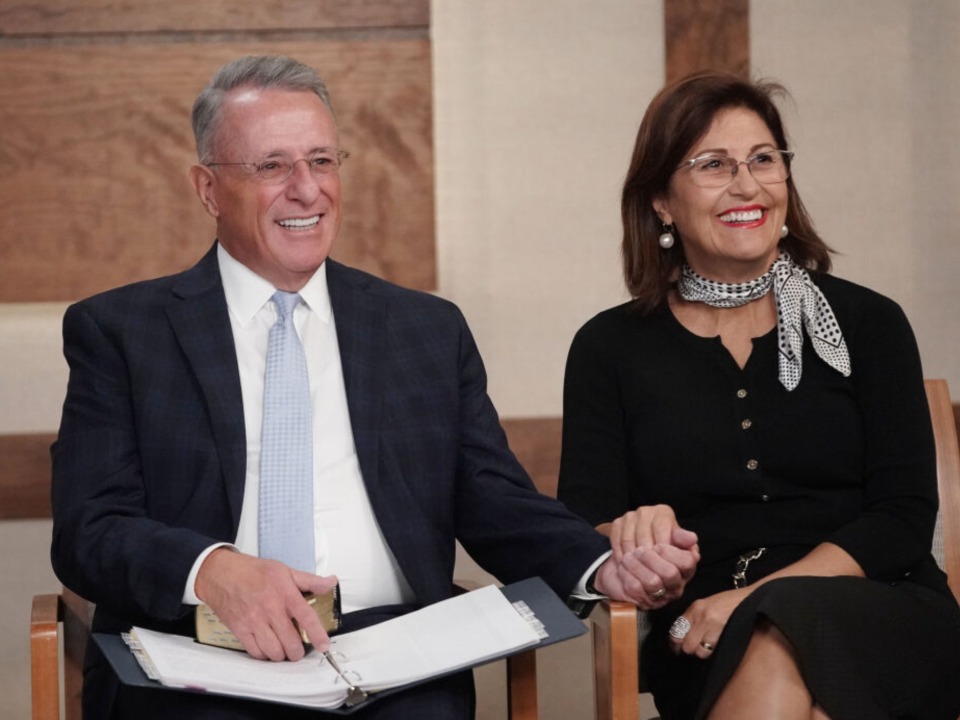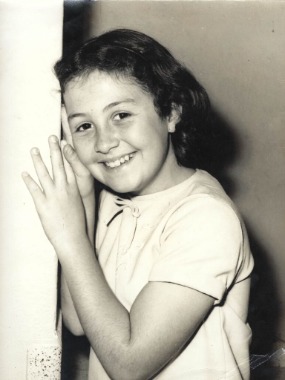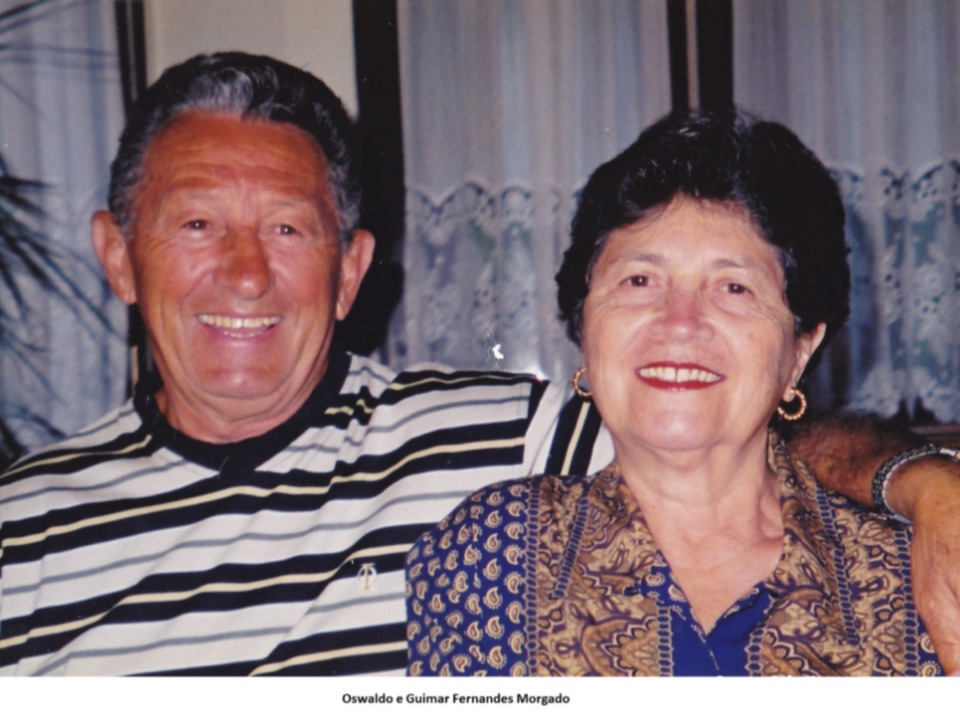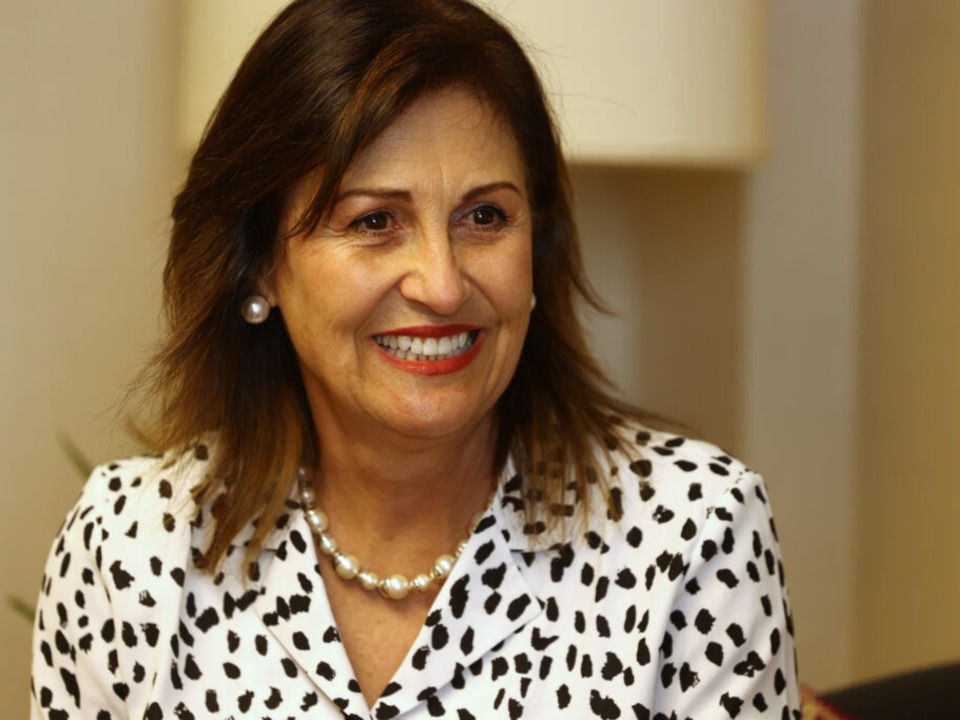
This story appears here courtesy of TheChurchNews.com. It is not for use by other media.
By Jon Ryan Jensen, Church News
Raised in São Paulo, Brazil, Sister Rosana Soares didn’t grow up in a religious family. Still, her parents — who were “marvelous without a doubt” — taught her good principles.
When she was 9 years old, Sister Soares’ 14-year-old sister, Margareth, was invited by a neighbor and friend to a Church activity.

Her sister returned from that first youth activity and reported to their mother what she had learned. Margareth said that people in her friend’s church didn’t drink coffee.
Sister Soares was sitting with a cup of coffee and a piece of bread at that moment and remembers pushing the cup of coffee away and saying that she would never drink it again.
Sister Soares shared her story with the Church News in preparation for RootsTech 2022, where Elder and Sister Soares will speak on March 5 as the keynote speakers for Family Discovery Day.
“Never again did coffee pass through my lips,” she said.
Sister Soares, the wife of Elder Ulisses Soares of the Quorum of the Twelve Apostles, now recognizes that the Holy Ghost was speaking to her in that moment and telling her to keep learning about this new religion.
Shortly after, a friend and neighbor who was also named Rosana invited Sister Soares to attend Primary. Her parents were friends with the family who invited her and were happy to have her attend with them.
Sister Soares quickly gained the desire to be baptized, but her parents were not comfortable with that. They wanted her to wait until she was an adult to make that decision.
From Seminary to Missionary
When she was old enough to participate in seminary, her father originally told her that she could not attend because of the early, dark hour, and he would not allow her to take a bus by herself.
Then her seminary teacher at the time offered to pick Sister Soares up each day.
For the next four years, she said she attended seminary Monday through Friday even though she still wasn’t a member of the Church.
After she turned 17 and finished her seminary classes, she told her father that she felt she had done enough to show him that she was making these decisions for herself and she wanted to be baptized. He said that if she were to be baptized, he would expect her to live up to all the responsibilities of her new religion.
“‘If you say you’re going to do it, you’re going to do it,’ he told me. And he was serious.”
On a cold (by São Paulo standards) and rainy Saturday in March, Sister Soares went to the chapel to be baptized. Neither of her parents attended, she said.
Soon after, her bishop, Paulo Puerta, encouraged her to receive her patriarchal blessing.
“In my patriarchal blessing, it talked about my mission,” she said. “I loved missionaries. Every time I saw a sister missionary, I would say, ‘I’m going to be a missionary.’”
Again, Sister Soares’ father said “no.”
Everything was new to her parents, she said. They couldn’t understand why she wanted to go.
So she started asking her bishop and stake president about what it would take for her to serve a mission. After months of discussions with her parents and Church leaders, she finally received permission and received a call to serve in the former Brazil Rio de Janeiro Mission.
Due to her unique circumstances and young age, Sister Soares began full-time missionary service without having the opportunity to attend the temple.
Because of her parents’ insistence that she live what she promised to live, she knew she could not be casual about her covenants, and she knew the Lord would also fulfill His promises, she said.
“I knew my commitment could never be superficial,” she said.

Putting God First in Marriage
Sister Soares became acquainted with her future husband a short time later in the mission field. After they returned home, they ran into each other at a multi-stake dance where they unexpectedly started to make a romantic connection. Weeks later, they began dating.
“I married a marvelous man who had a vigorous testimony,” she said. “But that doesn’t mean that everything in our life was perfect. It wasn’t. It isn’t.”
“When we got married, we set a goal to include God in our marriage and in our family.”
“We knew that without Him, we had nothing.”
When they were first married, the Soareses set a goal to always set aside a night for their family — even before they had children.
“The first week we were married, we sat down together on Sunday night and pulled out a small notebook,” Sister Soares said. “It was like being companions in a mission since we were both returned missionaries. And we had our notebook to write down what we did and our goals together.”
“The first goal we wrote down was to have patience — patience with each other, through difficulties, in our callings.”
Through the years, the Soareses have filled many notebooks with their stories and notes from nights together as a family.
“All of them, absolutely all of them, include the goal to be patient,” she said. “Why? Because we are flawed. We are of the natural man.”
The biggest thing Sister Soares has learned — whether from attending church as a little girl, serving a mission, or having a family — is this:
“God is always there for us.”
Building a Family
One of the blessings Sister Soares looked forward to the most from her patriarchal blessing was that of having children. but that did not happen the way she had imagined it would.
Multiple doctors said she would never have children.
The Lord expects us to “do our part” and not expect Him to do everything for us, she said.
For that reason, the Soareses continued to do everything they could to have children. They worked with many doctors.
“If we’re doing our part,” she said, “He will guide us.”
As part of their journey to build a family, the Soareses lost two children, both born prematurely. “This was not easy,” Sister Soares said.
“But we have five children in our family, not just the three who are alive,” she said.
Learning to Hear Him
Key to her personal testimony is knowing when Heavenly Father is speaking to the “ears of my heart,” she said.
“The Holy Ghost speaks to different people in different ways,” she said. “For me, He speaks through the scriptures.”
She knows that when she has a question and prays to Heavenly Father for an answer, that she has to immediately go to the scriptures to find the answer.
One day, she said she prayed to Heavenly Father and promised him she would always read the scriptures.
“I said, ‘Lord, I promise you this. Every day of my life — whether I am on vacation or sick or in the hospital or in whatever situation I am in — I will never let a day pass without looking to Thy words.’”
Even decades later, she said she has never failed to live up to that promise.

Have Testimony, Will Travel
When Elder Soares was called to serve as a mission president in Portugal, their children were 5, 9 and 13 years old.
After returning from Portugal, Elder Soares was called as a General Authority Seventy and served in the Brazil and Africa Southeast Area Presidencies.
“We loved it,” Sister Soares said about their service in these nations. “That was a divine experience for us.”
One of the blessings of serving in Portugal was the opportunity to do family history work for her family, Sister Soares said.
“I went to some of the places where my ancestors were born,” she said. “And I was able to complete some of my family tree and learn more of my family history.”
“I discovered things by being there that I never would have discovered only by looking at microfilm.”
A Legacy for the Grandchildren
“People say that in life you have to plant a tree, have a child and write a book,” Sister Soares said. “Well, I’ve already planted various trees. We had five children — three who are alive and two who aren’t. And we have five grandchildren. And now I’ve written my own little storybook.”
Sister Soares’ self-published book was something she wrote for her grandchildren to help them see people as Heavenly Father sees them, not as the world sees them.
“Growing up, I never identified people by their appearance, ethnicity or nationality,” she said. “I never paid attention to those things.”
“And I wanted my grandchildren to know that those aren’t the characteristics that God sees in them,” she said. “He identifies all of them as His children.”
“I wanted to leave a legacy. I wanted them to read my testimony,” she said. “You can’t measure the size of a testimony, but they will always be able to read my words.”
Copyright 2022 Deseret News Publishing Company